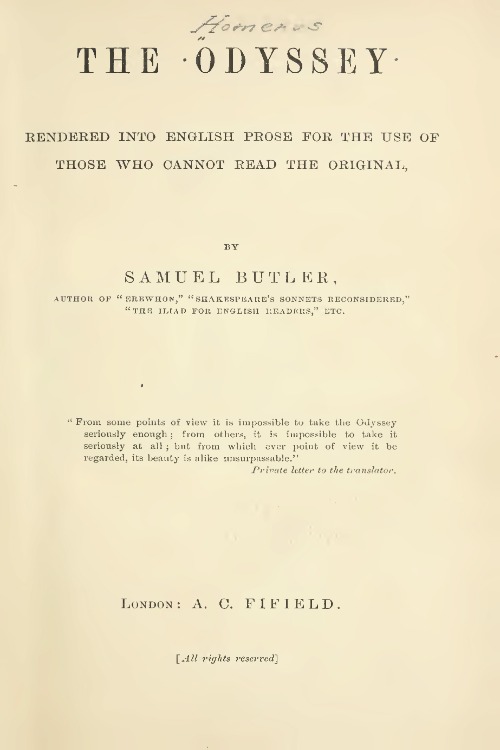Text summary
From: Book · Samuel Butler · 1900

Text: Full Translation, Collation (partial)
Ancient Greek ⟶ English a b
Record notes
About these data
| Data provider | Perseus Scaife Viewer |
| Record no. | urn:cts:greekLit:tlg0012.tlg002.perseus-eng4 Odyssey, The Odyssey of Homer rendered into English prose for the use of those who cannot read the original Revised by Timothy Power and Gregory Nagy |
| Retrieval date | Jul. 21, 2020 |
| Copyright | Perseus Digital Library @ Tufts |
Background
The Odyssey (Samuel Butler translation) is a well-known and freely available translation of the Odyssey hero myth (first published in 1900). Samuel Butler, who also translated the Iliad in 1898, took a keen interest in Greek mythology and translated standard prose versions of the epics in order that they could be read by a wider audience. Like The Iliad, the Odyssey also has twenty-four books.
Cite this page
OMNIKA Foundation Contributors. ""The Odyssey": English Translation by Samuel Butler." OMNIKA – World Mythology Index, OMNIKA Foundation, 04 May. 2019, omnika.org/stable/133. Accessed 27 Feb. 2026.
OMNIKA (2019, May 04). "The Odyssey": English Translation by Samuel Butler. Retrieved from https://omnika.org/stable/133
OMNIKA Foundation Contributors. ""The Odyssey": English Translation by Samuel Butler." Las Vegas, NV: OMNIKA Foundation. Created May 04, 2019. Accessed February 27, 2026. https://omnika.org/stable/133.





